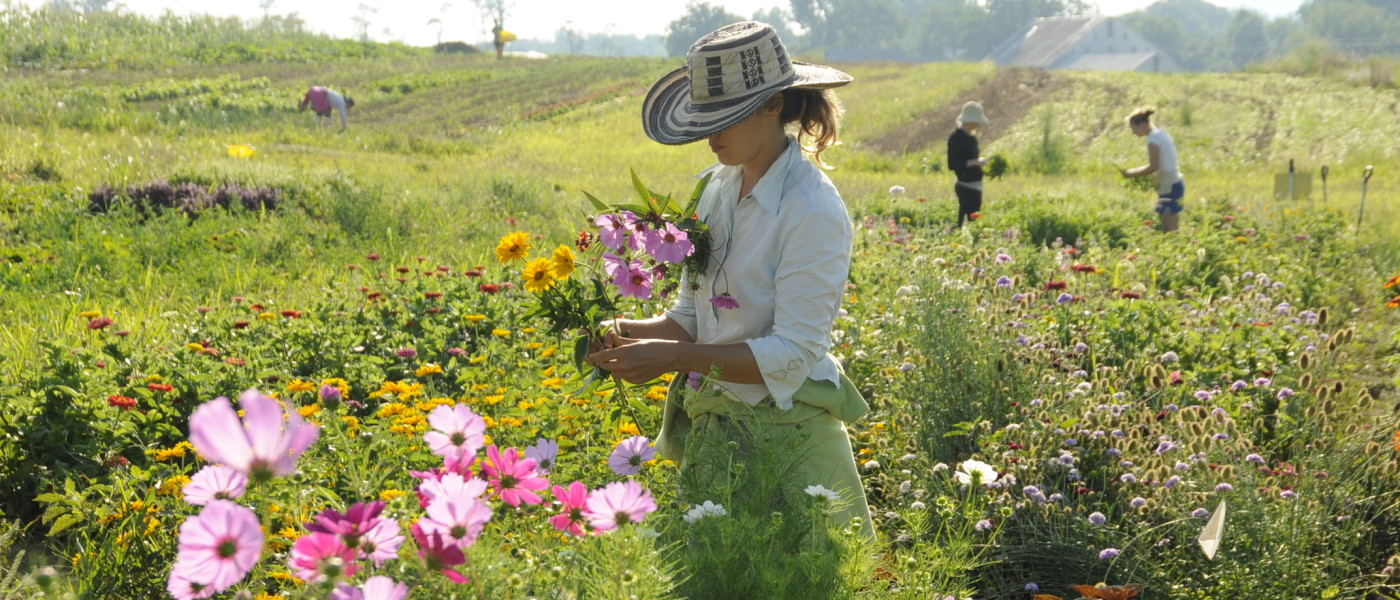Jenn Halpin established the Dickinson College Farm in 2007. She is the Farm Manager of the organic farm, which feeds its student body and engages students from all academic backgrounds in agriculture.
Jenn Halpin graduated from Providence College with a degree in Political Science and German Studies, and no idea that she would become a farmer. After graduation, Jenn traveled to West Africa as a Peace Corps volunteer where she was introduced to subsistence agriculture. “I was inspired by the farmers in my village and started learning how to grow food. I haven’t stopped farming since.”
Upon her return to the US, Jenn interned with a CSA farm in Pennsylvania and then headed to California to apprentice with John Jeavons, a pioneer in the biointensive farming movement. In 2002, Jenn returned East, accepting the position of Student Garden Coordinator at Dickinson College in Carlisle, PA. Jenn and her partner Matt Steiman also rented land nearby to raise vegetables for a budding CSA. When their lease on the farm suddenly expired, Jenn went in search of other land. Happily, she discovered the college owned a piece of land six miles from campus. “We wrote a business plan proposing the idea of transitioning part of the land into a production and educational farming program. [Dickinson College] agreed that it was an interesting idea and in 2007 we started the program,” explains Jenn.
Today Jenn is the Farm Manager and Director of the Dickinson College Farm, which operates on 50 acres, producing mixed crops and raising livestock. Beef cattle supply Dickinson College with hamburgers for the school’s cafeterias. In fact, 75% of the food produced on the farm is sent to Dickinson College. The farm also produces eggs, which are sold through the college’s Campus Supported Agriculture (CSA) program. Through the program, Dickinson faculty, staff, students and alumni are able to buy shares of the farm’s harvest.
According to Jenn, the farm’s success depends on the combined efforts of staff, faculty and students. The farm’s program coordinator, Ali Frohman, helps Jenn with programming and campus outreach and Matt, the co-farm manager, helps split the workload involved with managing a diversified production and education farm. This allows Jenn to focus on providing assistance to campus faculty and students. “[I] help faculty develop course ideas that are based on the farm and then work with students to develop their interest from an academic standpoint,” says Jenn.
Because Dickinson College does not have an agriculture-specific academic department, the College Farm is “a place for all departments.” Jenn and her staff work with a wide range of departments within the liberal arts college. Across the campus, faculty members have begun to integrate food and food issues into their course objectives.
Students are employed on the farm during the academic school year and over the summer. An apprentice program was developed for graduate students who “have a sincere interest in developing their skills as farmers.” Student farmers, who are paid through the federal work study program, are guaranteed a slot on the farm for their entire academic career. According to Jenn, the goal of such a lengthy employment contract is to “train [students] and teach them skills that they can constantly improve upon. They become partners in our goals and our initiatives and take ownership in the program.” The farm has become a staple on campus and in the surrounding community of Carlisle. Last year, The Dickinson College Farm donated 3,000 pounds of food to the local food bank.
Dickinson College Farm strives to provide for its community in a way that is sustainable. “One of our goals is to ensure that we leave the soil in better condition than we found it in,” explains Jenn. The farm established a composting initiative and has assumed responsibility for collecting and composting food waste from the dining hall and local establishments. The farm hosts educational workshops that aim to share information with farmers, other academic institutions and community members.
The Dickinson College Farm was approved for a 2014 expansion, which will increase pasture lands and expand their production capacity. Jenn hopes to increase the farm’s beef cow herd to better supply the campus dining hall. The farm’s main objective remains the same: to educate and support students on the wide ranging topics that relate to food and food production, and inspire others to take an interest in where their food comes from. Jenn is inspired by the steadfast commitment of her students, who understand that their work affects the surrounding community and that their role as farmers is in growing demand. Jenn explains, “It’s a very powerful experience for our students to witness the fruits of their labor being appreciated by market customers or served to their peers in the dining hall.”



